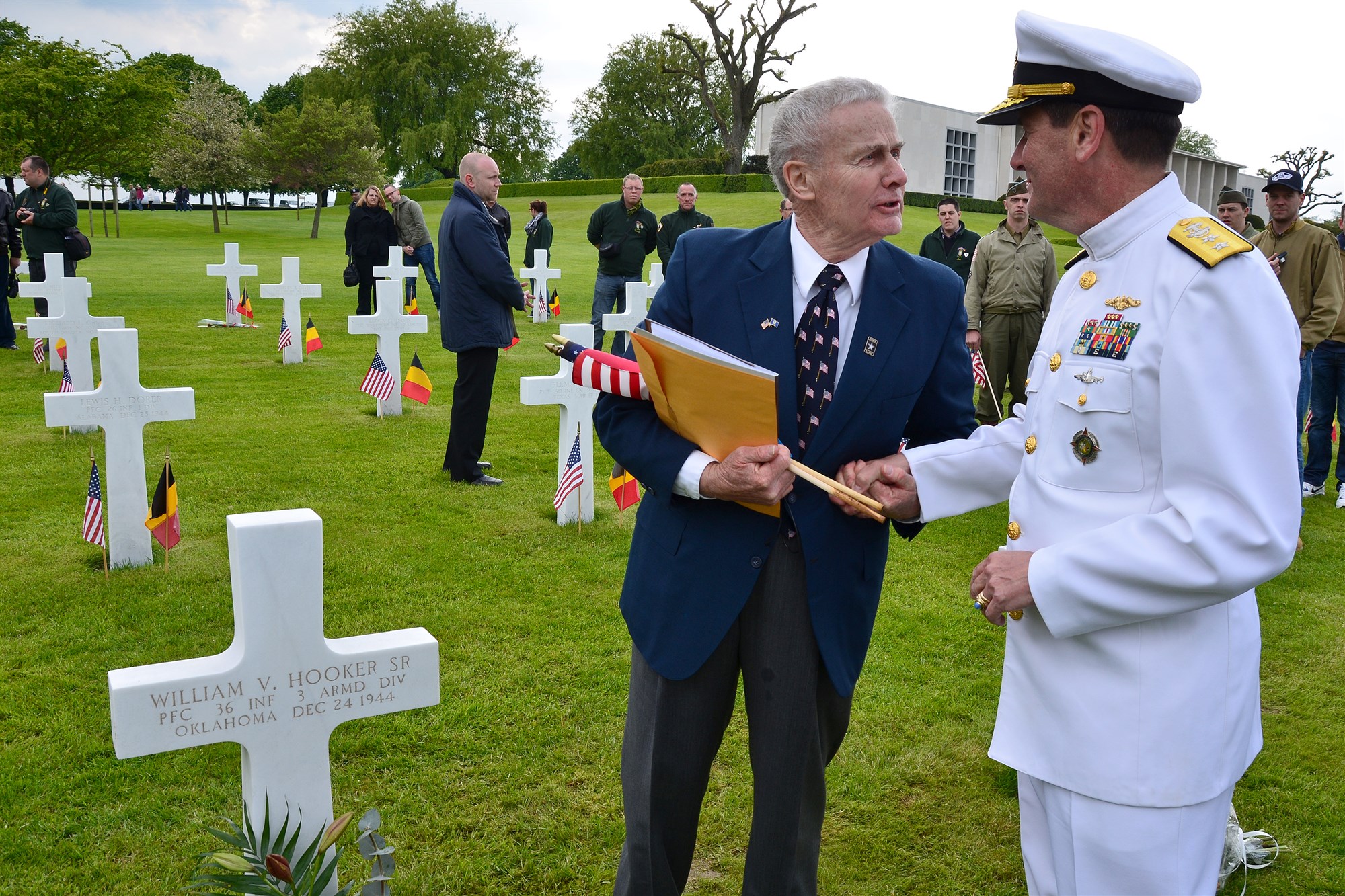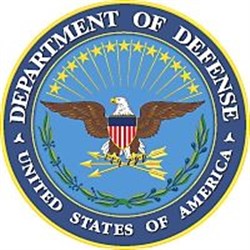HENRI CHAPELLE, Belgium – Hundreds of people gathered May 25 at Henri Chapelle American Cemetery, where amid the rolling hills of Belgium’s countryside is the final resting place of 7,992 U.S. troops who died in World War II.
Among those who gathered was Rear Admiral John G. Messerschmidt, from U.S. European Command, who paid his personal respects to Pfc. Anthony Di Natale, the uncle of his brother-in-law.
“It’s very emotional,” Messerschmidt said, while walking among the rows of white marble headstones. “This was my opportunity to say thanks to him and all the heroes at Henri Chapelle.”
At a late-afternoon ceremony, Messerschmidt spoke of sacrifices made by so many, to include Pfc. Anthony Di Natale, who left Pennsylvania and never returned. During the winter of 1944, Di Natale was with the 424th Infantry Regiment near Germany’ border. A German division attacked with overwhelming force in a surprise winter offensive now known as the Battle of the Bulge.
The attack began Dec. 16, 1944. Entire regiments were surrounded and forced to surrender. Di Natale’s unit withdrew into Belgium, reorganized and fought back. By mid-January, while attached to the 7th Armored Division, Di Natale’s regiment fought near St. Vith, Belgium. He died on Jan. 26.
A day earlier, on Jan. 25, his brother, Tech. Sgt. Carlo Di Natale was just 100 miles to the south, working on a Moselle River railroad bridge near Metz, France. An accident occurred and DiNatale, who was known as “Sam,” was killed. His unit’s history records the tragedy and its aftermath.
“It was hard to realize that ‘Smilin’ Sam’ was dead,” it reads. “This was the first tragedy that had overtaken the company and the feeling of sympathy and for the wife and children, one of whom he had never seen, was spontaneous.”
One son later served in the Navy. The other, a priest, presided over the 1972 wedding of his nephew to Messerschmidt’s sister.
“It’s for this reason that I wanted to speak here today,” Messerschmidt said. “To remind myself of the remarkable and short connections between all of us, those that serve and have served, those we can see and those we can remember.”
Carlo Di Natale now rests at the Luxembourg American Cemetery, about 120 miles south of his brother’s grave at Henri Chapelle, where 38 sets of brothers laid to rest, said Messerschmidt, who serves as EUCOM’s director of analysis assessments and as reserve component advisor to the commander.
“During World War II, when 12 million Americans were serving, it was very common to see multiple members of the same family fighting alongside one another, just like the Di Natales,” Messerschmidt said.
There are more than 100,000 Americans, killed in World Wars I and II, now buried in Europe. Their graves are maintained by the American Battle Monuments Commission, an U.S. government organization commemorating its 90th anniversary this year. Over the Memorial Day weekend, EUCOM service members took part in 22 ceremonies in six countries, to include Belgium, France, Italy, Luxembourg, the Netherlands and the United Kingdom.
In Paris, Maj. Gen Mark Barrett, EUCOM’s chief of staff, took part in a May 25 ceremony honoring the Lafayette Escadrille, a World War I unit comprised mostly of American volunteer aviators; and a May 26 event at Suresnes American Cemetery and Memorial.
“Sacrifice. Liberty. Freedom,” Barrett said. “As I stand here and reflect on the courageous men and women who served in our armed forces, these three words come to mind. They seem to transcend generations, age and culture.”
At Henri Chapelle, Pieter De Crem, Belgium’s defense minister and Jean-Claude Meurens, mayor of the nearby town of Aubel, also rendered tributes. Then, a local children’s group recited a poem on the importance of remembrance. Wreaths were placed in honor of the fallen.
U.S. military members from U.S. Army Garrison Benelux and NATO headquarters in Brussels supported the event. Both U.S. and Belgian troops served as wreath bearers. U.S. Ambassador Howard Gutman and Lt. Gen. David R. Hogg, who serves as a military representative at NATO headquarters, also took part.
The Belgian Navy band played “La Brabançonne” the Belgian national anthem, then “The Star-Spangled Banner.” A squad from Belgium’s 4th Engineer Battalion fired a rifle salute, followed by two Belgian buglers sounding Taps.
Several U.S. military veterans and families of fallen service members attended, said Bobby Bell, superintendent of the Henri Chapelle American Cemetery. Dignitaries met with those families following the ceremony.
“This is a very special time,” Bell said. “It’s the first time we’ve had so many family members here to participate in our Memorial Day event.”
Sharon Acuncius was just two years old when her father, Tech. Sgt. 5 Russell Taylor died. Part of the 424th Infantry Regiment during Battle of the Bulge, Taylor died on Dec. 22, 1944, leaving behind a wife, daughter and a son born a few months after his death. Acuncius, and her daughter, Cindy Renfro, of Illinois, spoke with Messerschmidt beside her father’s grave.
“I always wanted to come here,” Acuncius said. “It was important to see where my father is.”
Retired Lt. Col. William Hooker, Jr., of Oklahoma, stood beside the grave of his father, Pfc. William Hooker, Sr., who died on Christmas Eve 1944, while serving with the 36th Infantry Division. Only 12 when his father died, Hooker recalled how he got the news.
“I was in Sunday school,” Hooker said. “My father’s employer came in and said my mother had received a telegram from the war department saying my father was killed.”
Ambassador Gutman presented Hooker with the Belgian and U.S. flags. Before Messerschmidt turned to leave, Hooker grabbed the admiral’s hand and held pulled it close to his heart.
“He gave his life. I’m so proud,” Hooker said. “He loved his fellow man and he knew what freedom was all about.”





